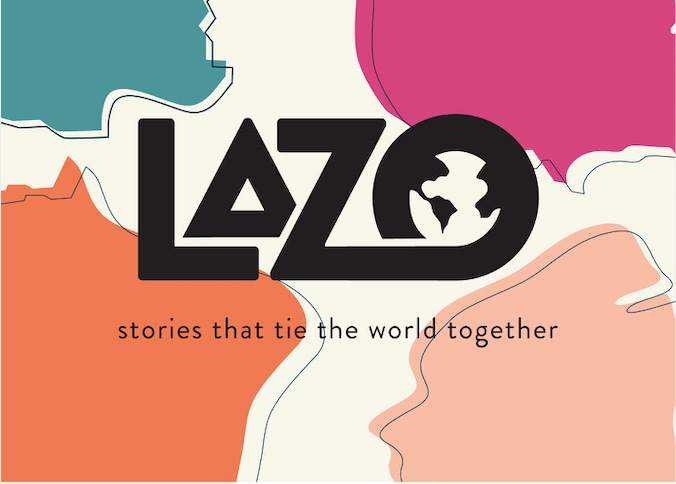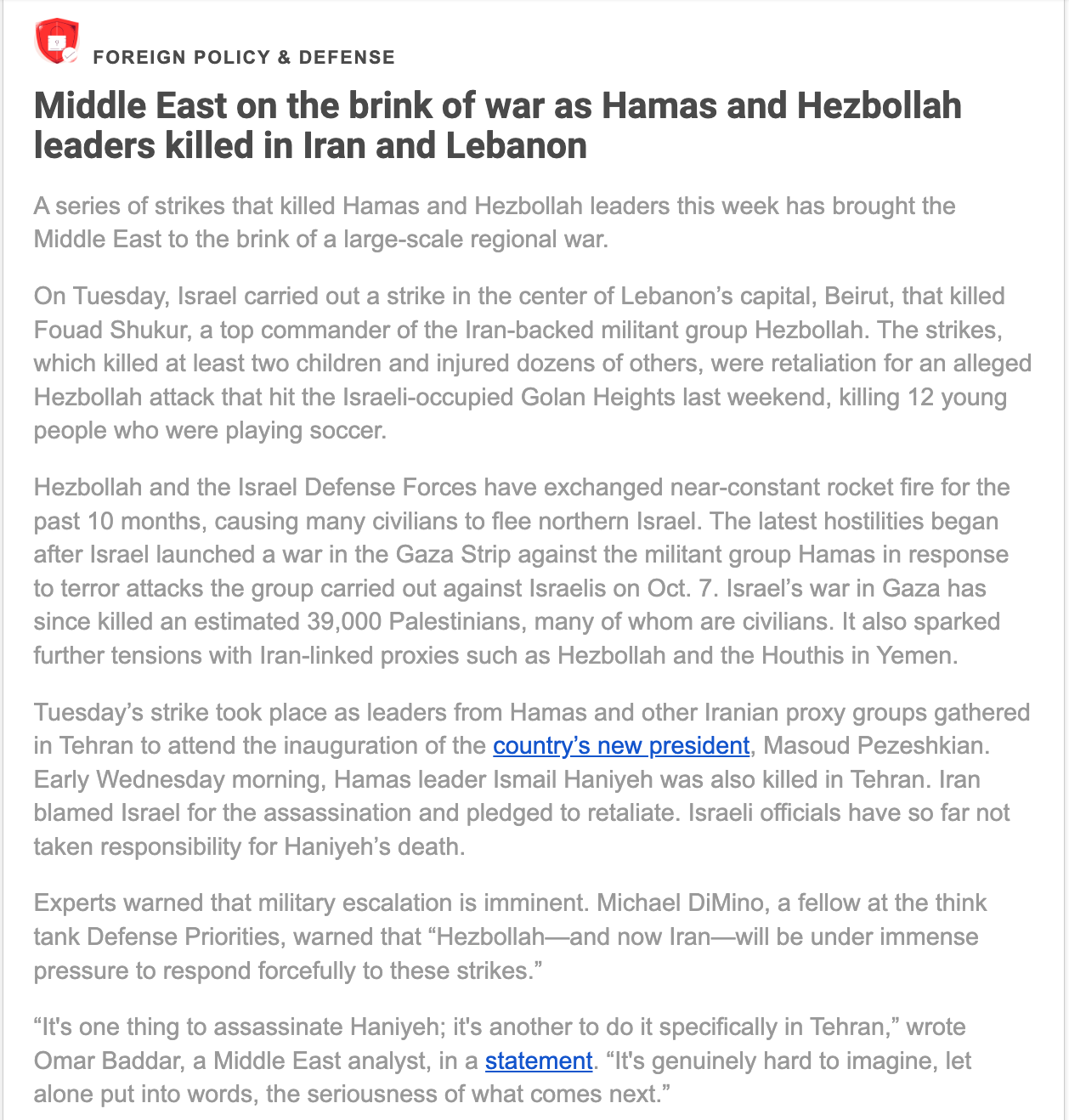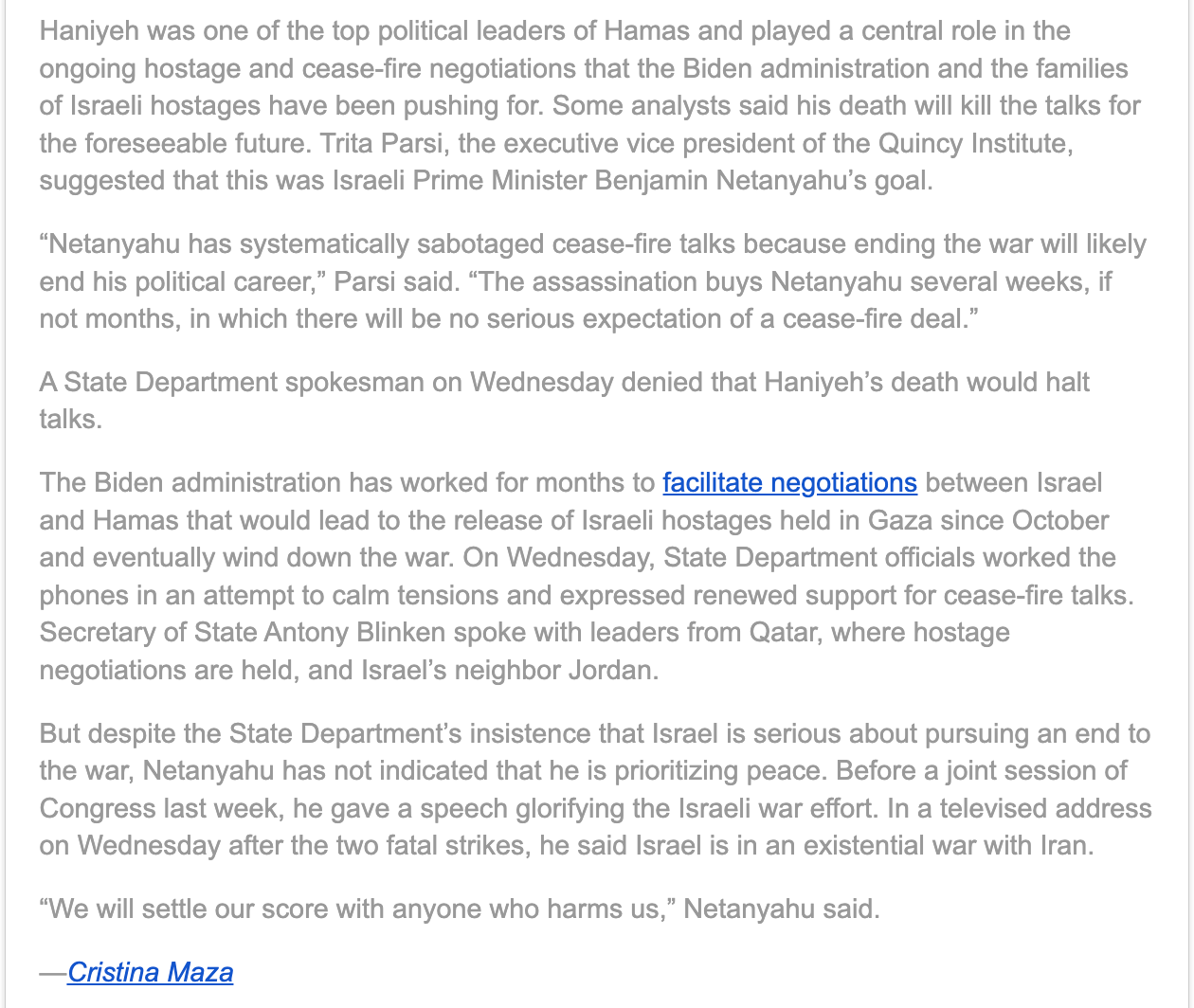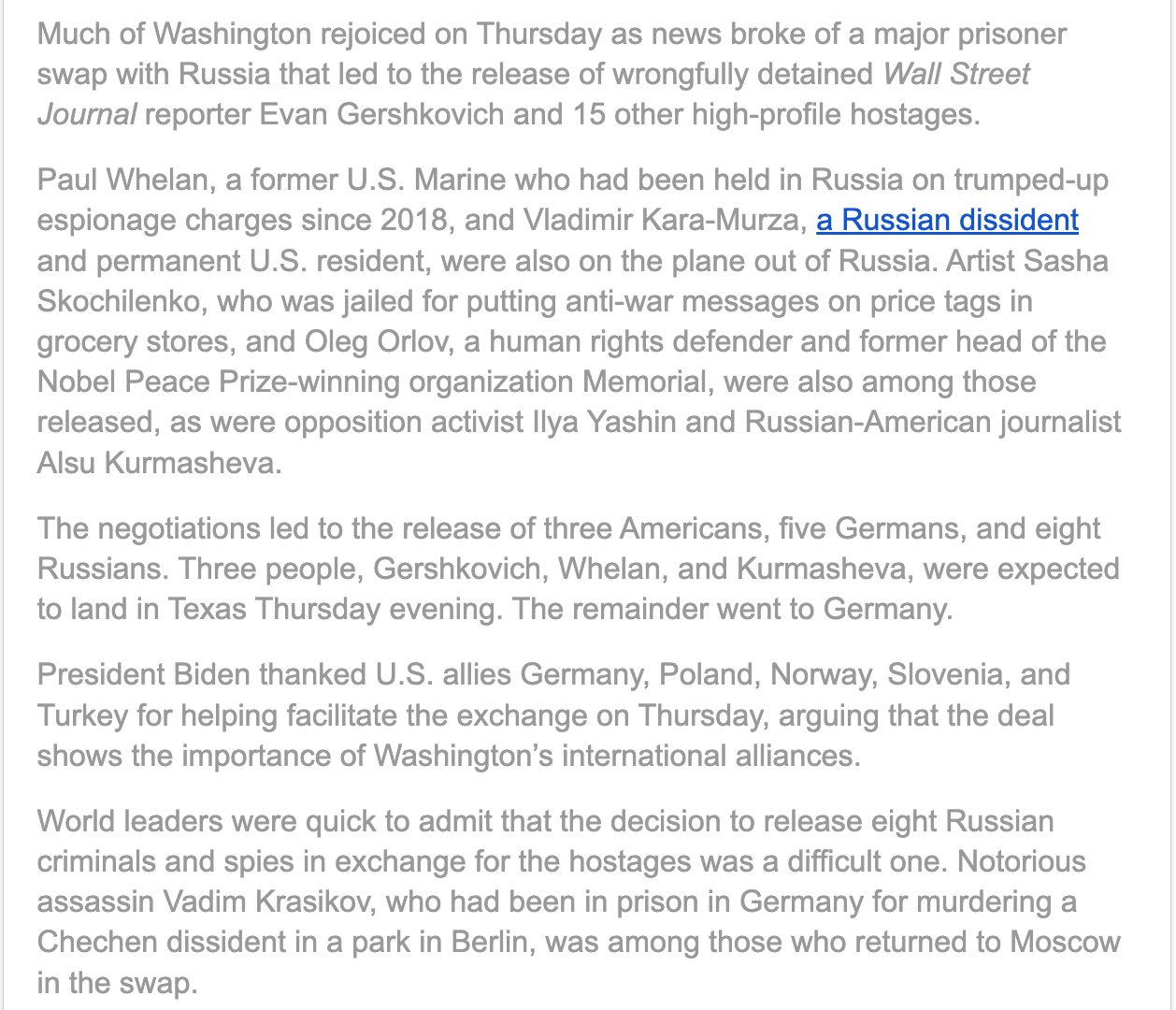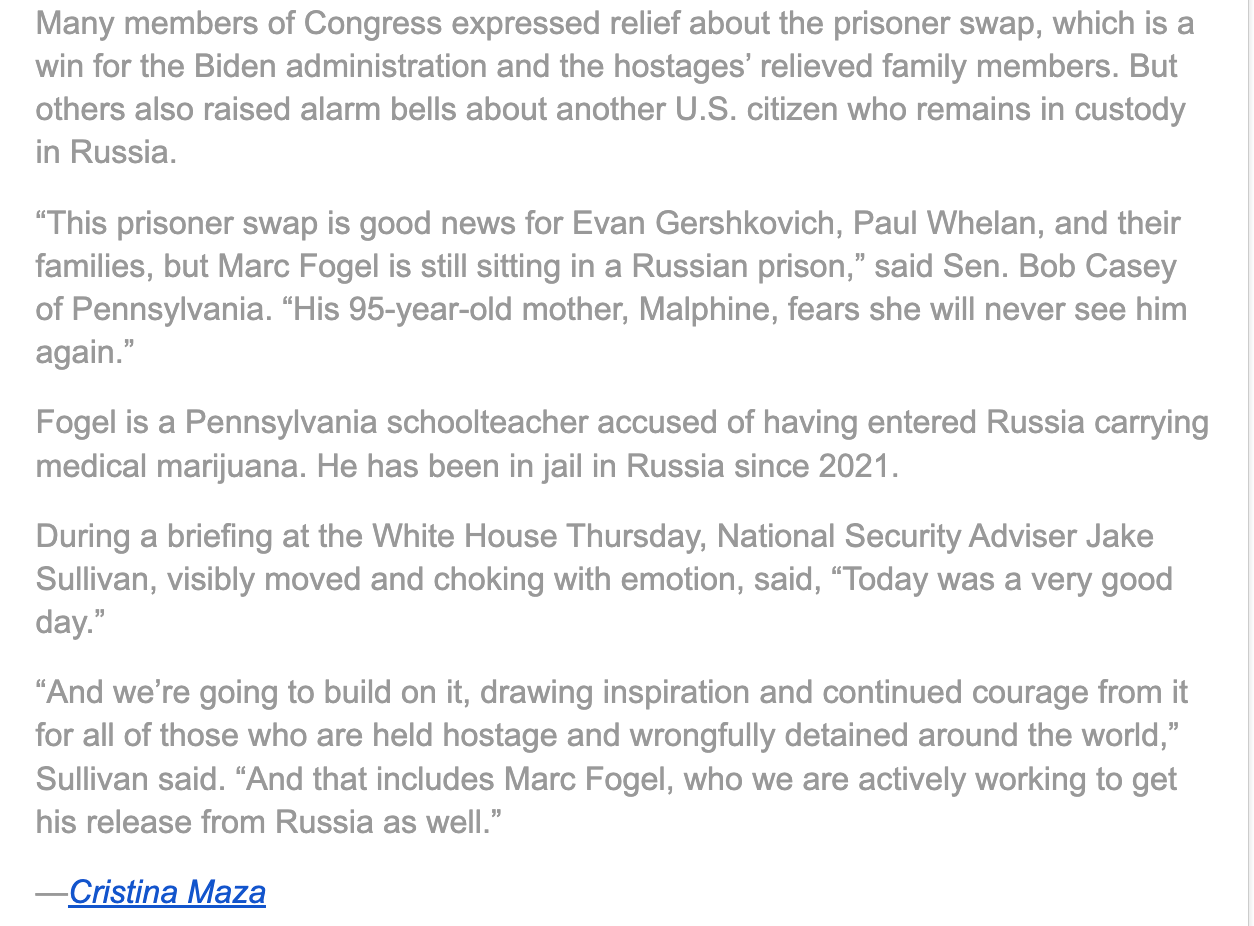What a century this week has been.
Assassinations, contested elections, and other pieces of history.
We have once again managed to cram a year’s worth of news into seven days. It started with Venezuelan strongman Nicolás Maduro stealing yet another election. But less than a day later, that was old news because someone (almost certainly Israel) killed a Hamas leader when he was visiting Iran for the new president’s inauguration, throwing hostage negotiations to end the war in Gaza into limbo. Reports later suggested that Ismail Haniyeh, one of the key figures in the ongoing ceasefire negotiations between Israel and Hamas, was killed with a bomb smuggled into his Tehran guesthouse months in advance.
Now, Iran is threatening retaliation and has reportedly authorized strikes into Israel in response. The Middle East could soon be headed into an all-out regional war. But again, many seem to have moved on because the news was already overshadowed by a historic prisoner swap with Russia that led to the release of 16 hostages and political prisoners.
The pace of the news is dizzying. Let’s see if we can make it through the first week of August without anything historic happening. Maybe our European friends can send us some of their summer vacation vibes.
I will be enjoying Baltimore’s Artscape Festival this weekend. I hope you’re spending your Sunday like this lady.

What I’m writing:
• Washington is calling on Venezuelan strongman Nicolás Maduro to release polling results to prove he really won Sunday's election. Opposition leaders say they have proof they won. Protests against the regime have spread across the country.
My weekly news blurbs:
What I’m reading:
• In an interview with Le Monde, Ukrainian President Volodymyr Zelensky discusses the possible outcome of the war and calls on China to pressure Russia to open the way to negotiations.
• Iran’s supreme leader issued an order for Iran to strike Israel directly in retaliation for the killing in Tehran of Hamas leader Ismail Haniyeh, the New York Times reports.
• Venezuelan President Nicolas Maduro warned that he will call for a “new revolution” if forced by what he calls “North American imperialism and fascist criminals,” the BBC reports. He also insisted his party is ready to present all the vote tallies from the country’s disputed election.
• The United States recognized Venezuela’s opposition presidential candidate, Edmundo González, as the winner of the country’s disputed election. Secretary of State Antony Blinken said that “the overwhelming evidence” shows González “won the most votes.”
• Italy, which receives the most migrant arrivals in the European Union, opened the first of its two planned migrant camps in Albania, the BBC reports. The centers will house up to 3,000 migrants per month as part of Europe’s “offshoring” scheme.
• Amnesty International denounced unlawful detentions and substandard conditions in the EU-funded refugee center of Samos in Greece.
• The United States suspended $95 million in assistance to Georgia after its parliament adopted the controversial “foreign agents” law, the Associated Press reports.
• Politico Europe reports that Hungary and Slovakia are struggling to attract sympathy from other European capitals after Ukraine cut off their supply of Russian oil. Diplomats argue that the two countries had years to ween themselves off the supply, just as every other EU country did.
• The Financial Times reports that the European People’s Party chief Manfred Weber claimed that Hungary’s move to ease visa restrictions for Russian visitors could “create grave loopholes for espionage activities.”
• Dozens of Russian mercenaries were killed in an attack in Mali by Tuareg rebels in what appeared to be one of the deadliest attacks on Russian personnel on the continent since Moscow first sent Wager Group fighters there in 2017, the Wall Street Journal reports.
• Thousands of people rallied in towns across Serbia to protest a lithium excavation project the government recently signed with the European Union, the Associated Press reports.
• Turkey will invite Palestinian President Mahmoud Abbas to address its parliament in the coming days to “explain the Palestinian cause,” Reuters reports.
• Far-right protesters in Israel broke into a military base holding Palestinian detainees after nine reservists were detained in connection to allegations of “serious abuse of a detainee,” the Washington Post reports. The far-right called on Israel’s chief military prosecutor to “get your hands off the reservists.”
• Bangladesh banned the Jamaat-e-Islami party, its student wing, and other associate bodies as “militant and terrorist” organizations, the Associated Press reports. The move is part of a nationwide crackdown following weeks of deadly protests over government job quotas.
• Fighters on both sides of Sudan’s civil war carried out a wave of rapes, including attacking women in front of their families, sexually assaulting them in hospitals, and fatally injuring them during gang rapes, according to a report by Human Rights Watch.
• Famine has officially been declared in the Darfur region of Sudan, the New York Times reports.
You can write to me for any reason: c.maza@protonmail.com





